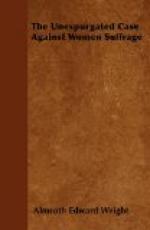V
ULTERIOR ENDS WHICH THE WOMAN’S SUFFRAGE MOVEMENT HAS IN VIEW
We have now sufficiently considered the suffragist’s humanitarian schemes, and we may lead up to the consideration of her further projects by contrasting woman’s suffrage as it presents itself under colonial conditions—i.e. woman’s suffrage without the female legislative reformer and the feminist—with the woman suffrage which is being agitated for in England—i.e. woman suffrage with the female legislative reformer and the feminist.
In the colonies and undeveloped countries generally where women are in a minority, and where owing to the fact that practically all have an opportunity of marrying, there are not for woman any difficult economic and physiological conditions, there is no woman’s question; and by consequence no female legislative reformer or feminist. The woman voter follows, as the opportunist politicians who enfranchised her intended, the lead of her men-folk—serving only a pawn in the game of politics. Under such conditions woman’s suffrage kleaves things as they are, except only that it undermines the logical foundations of the law, and still further debases the standard of public efficiency and public morality.
In countries, such as England, where an excess female population [1] has made economic difficulties for woman, and where the severe sexual restrictions, which here obtains, have bred in her sex-hostility, the suffrage movement has as its avowed ulterior object the abrogation of all distinctions which depend upon sex; and the achievement of the economic independence of woman.
[1] In England and Wales there are, in a population of 8,000,000 women between the ages of twenty and fifty, 3,000,000 unmarried women.
To secure this economic independence every post, occupation, and Government service is to be thrown open to woman; she is to receive everywhere the same wages as man; male and female are to work side by side; and they are indiscriminately to be put in command the one over the other. Furthermore, legal rights are to be secured to the wife over her husband’s property and earnings. The programme is, in fact, to give to woman an economic independence out of the earnings and taxes of man.
Nor does feminist ambition stop short here. It demands that women shall be included in every advisory committee, every governing board, every jury, every judicial bench, every electorate, every parliament, and every ministerial cabinet; further, that every masculine foundation, university, school of learning, academy, trade union, professional corporation and scientific society shall be converted into an epicene institution—until we shall have everywhere one vast cock-and-hen show.
The proposal to bring man and woman together everywhere into extremely intimate relationships raises very grave questions. It brings up, first, the question of sexual complications; secondly, the question as to whether the tradition of modesty and reticence between the sexes is to be definitely sacrificed; and, most important of all, the question as to whether epicene conditions would place obstacles in the way of intellectual work.




